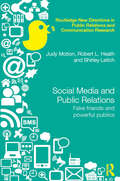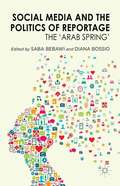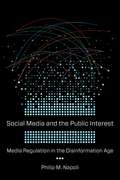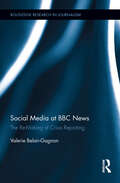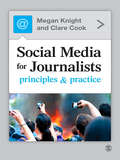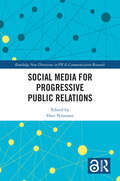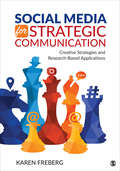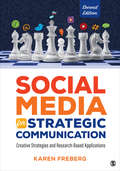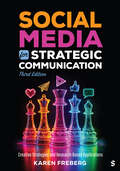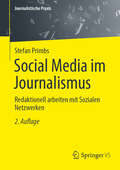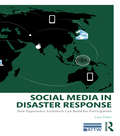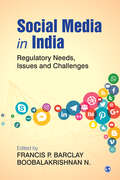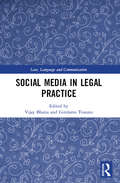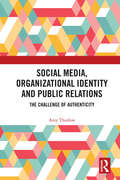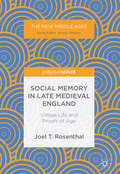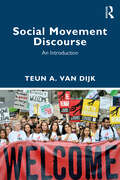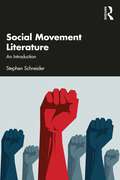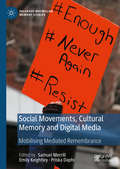- Table View
- List View
Social Media and Public Relations: Fake Friends and Powerful Publics (Routledge New Directions in PR & Communication Research)
by Robert L. Heath Judy Motion Shirley LeitchSocial media is having a profound, but not yet fully understood impact on public relations. In the 24/7 world of perpetually connected publics, will public relations function as a dark art that spins (or tweets) self-interested variations of the truth for credulous audiences? Or does the full glare of the internet and the increasing expectations of powerful publics motivate it to more honestly engage to serve the public interest? The purpose of this book is to examine the role of PR by exploring the myriad ways that social media is reshaping its conceptualization, strategies, and tactics. In particular, it explores the dichotomies of fake and authentic, powerless and powerful, meaningless and meaningful. It exposes transgressions committed by practitioners—the paucity of digital literacy, the lack of understanding of the norms of social media, naivety about corporate identity risks, and the overarching emphasis on spin over authentic engagement. But it also shows the power that closely networked social media users have to insert information and opinion into discussions and force "false PR friends" to be less so. This timely, challenging, and fascinating book will be of interest to all students, researchers, and practitioners in Public Relations, Media, and Communication Studies. Winner of the 2016 NCA PRIDE Award for best book
Social Media and the Politics of Reportage
by Saba Bebawi Diana BossioSocial Media and the Politics of Reportage explores the journalistic challenges, issues and opportunities that have risen as a result of social media increasingly being used as a form of crisis reporting within the field of global journalism, with a focus on the protests during the 'Arab Spring'.
Social Media and the Public Interest: Media Regulation in the Disinformation Age
by Philip M. NapoliFacebook, a platform created by undergraduates in a Harvard dorm room, has transformed the ways millions of people consume news, understand the world, and participate in the political process. Despite taking on many of journalism’s traditional roles, Facebook and other platforms, such as Twitter and Google, have presented themselves as tech companies—and therefore not subject to the same regulations and ethical codes as conventional media organizations. Challenging such superficial distinctions, Philip M. Napoli offers a timely and persuasive case for understanding and governing social media as news media, with a fundamental obligation to serve the public interest.Social Media and the Public Interest explores how and why social media platforms became so central to news consumption and distribution as they met many of the challenges of finding information—and audiences—online. Napoli illustrates the implications of a system in which coders and engineers drive out journalists and editors as the gatekeepers who determine media content. He argues that a social media–driven news ecosystem represents a case of market failure in what he calls the algorithmic marketplace of ideas. To respond, we need to rethink fundamental elements of media governance based on a revitalized concept of the public interest. A compelling examination of the intersection of social media and journalism, Social Media and the Public Interest offers valuable insights for the democratic governance of today’s most influential shapers of news.
Social Media at BBC News: The Re-Making of Crisis Reporting (Routledge Research in Journalism)
by Valerie Belair-GagnonSince the emergence of social media in the journalistic landscape, the BBC has sought to produce reporting more connected to its audience while retaining its authority as a public broadcaster in crisis reporting. Using empirical analysis of crisis news production at the BBC, this book shows that the emergence of social media at the BBC and the need to manage this kind of material led to a new media logic in which tech-savvy journalists take on a new centrality in the newsroom. In this changed context, the politico-economic and socio-cultural logic have led to a more connected newsroom involving this new breed of journalists and BBC audience. This examination of news production events shows that in the midst of transformations in journalistic practices and norms, including newsgathering, sourcing, distribution and impartiality, the BBC has reasserted its authority as a public broadcaster. Click here for a short video about the book.
Social Media for Journalists: Principles and Practice
by Megan Knight Clare Cook"Untangles the jargon and sets out the route-map for how the social network can enable us to become major contributors to the multiplatform digital age. The right message, the right time - this is the right book for taking advantage of it all." - Jon Snow, Channel 4 News The essential guide to understanding and harnessing the tools of journalism today, Meagan Knight and Clare Cook show you how to master the enduring rules of good practice and the new techniques of social media. The book gives a thorough guide to principles and practice, including: How to find, write and break stories with social media An online journalism toolkit to get you started Using crowdsourcing to find and follow stories Getting on top of user-generated content The ins and outs of copyright and ethics Building your brand and making money The new economy of journalism and how to get ahead. More than a simple ′how-to′ guide, this book takes you to the next level with its integration of theory and practice. It is a one-stop guide for students and practitioners of journalism.
Social Media for Progressive Public Relations (Routledge New Directions in PR & Communication Research)
by Outi NiininenThis edited book presents a comprehensive, research-led coverage of the progressive ways public relations (PR) and social media is utilised today. It offers innovative research approaches to explore PR and social media initiatives, and in so doing, provides guidance on how to direct PR communication across the complex canvas of social media where some of the communication can be highly emotional varying from overt expressions of loyalty to brandjacking. Progressive organisations are carefully engaging with their audiences in multiple social media channels with organisational goals including commercial success, sustainability or employee morale. The analytics offered by social media channels help organisations to learn about their audiences as well as design highly personalised content. This book extends our understanding of the ways PR and social media can be utilised for communication that resonates with target audiences in varying context. Through the academic research presented, readers can also learn innovative ways to investigate and improve their own PR and social media practice. The book’s main themes include the power of engagement, progressive management use of social media channels, business influence, social-influencing for non-profit causes and political impacts of targeted social media communications. Social Media for Progressive Public Relations is for scholars, researchers and students of PR and communications.
Social Media for Progressive Public Relations (Routledge New Directions in PR & Communication Research)
by Outi NiininenThis edited book presents a comprehensive, research-led coverage of the progressive ways public relations (PR) and social media is utilised today. It offers innovative research approaches to explore PR and social media initiatives, and in so doing, provides guidance on how to direct PR communication across the complex canvas of social media where some of the communication can be highly emotional varying from overt expressions of loyalty to brandjacking.Progressive organisations are carefully engaging with their audiences in multiple social media channels with organisational goals including commercial success, sustainability or employee morale. The analytics offered by social media channels help organisations to learn about their audiences as well as design highly personalised content. This book extends our understanding of the ways PR and social media can be utilised for communication that resonates with target audiences in varying context. Through the academic research presented, readers can also learn innovative ways to investigate and improve their own PR and social media practice. The book’s main themes include the power of engagement, progressive management use of social media channels, business influence, social-influencing for non-profit causes and political impacts of targeted social media communications.Social Media for Progressive Public Relationsis for scholars, researchers and students of PR and communications.Chapters 12, 13 and 14 of this book are freely available as a downloadable Open Access PDF at http://www.taylorfrancis.com under a Creative Commons [Attribution-Non Commercial-No Derivatives (CC-BY-NC-ND)] 4.0 license.
Social Media for Strategic Communication: Creative Strategies and Research-Based Applications
by Karen FrebergSocial Media for Strategic Communication: Creative Strategies and Research-Based Applications, by Karen Freberg teaches you the skills and principles needed to use social media in persuasive communication campaigns. The book combines cutting-edge research with practical, on-the-ground instruction to prepare you for the real-world challenges you will face in the workplace. The text addresses the influence of social media technologies, strategies, actions, and the strategic mindset needed by social media professionals today. By focusing on strategic thinking and awareness, it gives you the tools they need to adapt what you learn to new platforms and technologies that may emerge in the future. A broad focus on strategic communication—from PR, advertising, and marketing, to non-profit advocacy—gives you a broad base of knowledge that will serve you wherever your career may lead.
Social Media for Strategic Communication: Creative Strategies and Research-Based Applications
by Karen FrebergSocial Media for Strategic Communication: Creative Strategies and Research-Based Applications, by Karen Freberg teaches you the skills and principles needed to use social media in persuasive communication campaigns. The book combines cutting-edge research with practical, on-the-ground instruction to prepare you for the real-world challenges you will face in the workplace. The text addresses the influence of social media technologies, strategies, actions, and the strategic mindset needed by social media professionals today. By focusing on strategic thinking and awareness, it gives you the tools they need to adapt what you learn to new platforms and technologies that may emerge in the future. A broad focus on strategic communication—from PR, advertising, and marketing, to non-profit advocacy—gives you a broad base of knowledge that will serve you wherever your career may lead.
Social Media for Strategic Communication: Creative Strategies and Research-Based Applications
by Karen FrebergSocial Media for Strategic Communication: Creative Strategies and Research-Based Applications Second Edition teaches students the skills and principles needed to use social media in persuasive communication campaigns. This book combines cutting edge research with practical, on-the-ground instruction to prepare students for the real-world challenges they’ll face in the workplace. By focusing on strategic thinking and awareness, this book gives students the tools they need to adapt what they learn to new platforms and technologies that may emerge in the future. A broad focus on strategic communication – from PR, advertising, and marketing, to non-profit advocacy—gives students a broad base of knowledge that will serve them wherever their careers may lead. The Second Edition features new case studies and exercises and increased coverage of diversity and inclusion issues and influencer marketing trends. INSTRUCTORS: Your students save when you bundle Social Media for Strategic Communication, Second Edition with Freberg′s Portfolio Building Activities in Social Media, Second Edition featuring 125 real-world activities across various social media platforms. Order using bundle ISBN 978-1-0718-6142-4.
Social Media for Strategic Communication: Creative Strategies and Research-Based Applications
by Karen FrebergSocial Media for Strategic Communication: Creative Strategies and Research-Based Applications Second Edition teaches students the skills and principles needed to use social media in persuasive communication campaigns. This book combines cutting edge research with practical, on-the-ground instruction to prepare students for the real-world challenges they’ll face in the workplace. By focusing on strategic thinking and awareness, this book gives students the tools they need to adapt what they learn to new platforms and technologies that may emerge in the future. A broad focus on strategic communication – from PR, advertising, and marketing, to non-profit advocacy—gives students a broad base of knowledge that will serve them wherever their careers may lead. The Second Edition features new case studies and exercises and increased coverage of diversity and inclusion issues and influencer marketing trends. INSTRUCTORS: Your students save when you bundle Social Media for Strategic Communication, Second Edition with Freberg′s Portfolio Building Activities in Social Media, Second Edition featuring 125 real-world activities across various social media platforms. Order using bundle ISBN 978-1-0718-6142-4.
Social Media for Strategic Communication: Creative Strategies and Research-Based Applications
by Karen FrebergSocial Media for Strategic Communication: Creative Strategies and Research-Based Applications teaches students the skills and principles needed to use social media in persuasive communication campaigns. Author Karen Freberg combines cutting-edge research with practical, hands-on instruction to prepare students for the challenges of today′s workplace. With an emphasis on strategic thinking and awareness, the book equips students to adapt their skills to emerging platforms and technologies. Its broad focus on strategic communication—from PR, advertising, and marketing to non-profit advocacy—provides a comprehensive foundation for success in diverse career paths. The Third Edition features a brand new chapter on social media and crisis communication, discussion of AI integrated in each chapter, and new case studies in addition to updated coverage of changes to platforms, trends, strategies, and emerging challenges across social media.
Social Media for Strategic Communication: Creative Strategies and Research-Based Applications
by Karen FrebergSocial Media for Strategic Communication: Creative Strategies and Research-Based Applications teaches students the skills and principles needed to use social media in persuasive communication campaigns. Author Karen Freberg combines cutting-edge research with practical, hands-on instruction to prepare students for the challenges of today′s workplace. With an emphasis on strategic thinking and awareness, the book equips students to adapt their skills to emerging platforms and technologies. Its broad focus on strategic communication—from PR, advertising, and marketing to non-profit advocacy—provides a comprehensive foundation for success in diverse career paths. The Third Edition features a brand new chapter on social media and crisis communication, discussion of AI integrated in each chapter, and new case studies in addition to updated coverage of changes to platforms, trends, strategies, and emerging challenges across social media.
Social Media for Writers: Marketing Strategies for Building Your Audience and Selling Books
by Tee Morris Pip BallantineMaximize the Potential of Your Online Brand!Over the past decade, social media has transformed from a fad into a necessity for writers. But for the inexperienced author, trying to make sense of--much less master--the available platforms can be a frustrating experience. The variety of social media options alone is dizzying enough: WordPress, Tumblr, Facebook, Twitter, Google+, YouTube, Pinterest, and more.That's where this guide comes in. Whether you're just starting to create an audience or looking to refine your online presence, Social Media for Writers will equip you with the essential tools you'll need to succeed. In this book you'll learn how to:Develop an editorial calendar: schedule consistent, quality content for your blog and work with other authors on guest posts and blog toursCreate an online brand: write content for several different networks, and tie them together to develop an authoritative, trusted voiceUtilize "best practices": learn the ins-and-outs of the online community and how to maximize the potential of each platformBuild a community: make connections and create a fan base to endorse your workYou'll also find appendixes that show you how to set up the major social media platforms and perform basic functions. With all of these strategies, techniques, and applicable information, Social Media for Writers is a comprehensive source for all your social media needs!
Social Media im Journalismus: Redaktionell arbeiten mit Sozialen Netzwerken (Journalistische Praxis)
by Stefan PrimbsDer Band führt in die praktischen Grundlagen von Social Media ein und zeigt, wie sich der Journalismus dadurch verändert hat. Er legt dar, wie die einzelnen Dienste sinnvoll im redaktionellen Alltag eingesetzt werden, wie man Strategien und journalistische Formate dafür entwickeln kann und wie man konstruktiv und gewinnbringend mit der Community arbeitet. Eine wichtige Rolle wird dem Zusammenspiel mit den Lesenden, Zuschauenden und Zuhörenden eingeräumt. Denn diese rücken von der rein passiven Rezipient:innen-Rolle in die aktive Rolle als Partner:innen der Journalist:innen. Auch will der Umgang mit User-Material gelernt sein. Vom Überprüfen und Verifizieren von Youtube-Videos bis zum redaktionellen Crowdsourcing bietet das Buch Checklisten und Muster-Konzepte sowie Beispiele aus der Praxis. Für die zweite Auflage wurde der Band grundlegend überarbeitet und aktualisiert.
Social Media in Disaster Response: How Experience Architects Can Build for Participation (ATTW Series in Technical and Professional Communication)
by Liza PottsSocial Media in Disaster Response focuses on how emerging social web tools provide researchers and practitioners with new opportunities to address disaster communication and information design for participatory cultures. Both groups, however, currently lack research toolkits for tracing participant networks across systems; there is little understanding of how to design not just for individual social web sites, but how to design across multiple systems. Given the volatile political and ecological climate we are currently living in, the practicality of understanding how people communicate during disasters is important both for those researching solutions and for those putting that research into practice. Social Media in Disaster Response addresses this situation by presenting the results of a large-scale sociotechnical usability study on crisis communication in the vernacular related to recent natural and human-made crisis; this is an analysis of the way social web applications are transformed, by participants, into a critical information infrastructure in moments of crisis. This book provides researchers with methods, tools, and examples for researching and analyzing these communication systems while providing practitioners with design methods and information about these participatory communities to assist them in influencing the design and structure of these communication systems.
Social Media in India: Regulatory Needs, Issues and Challenges
by Francis P. Barclay Boobalakrishnan N.Social media is acutely prone to misuse—thanks to its independent and undisciplined nature—necessitating regulation. The book addresses this concern, analysing critical sociopolitical issues related to social media regulation and discussing the latest developments in India. Social Media in India: Regulatory Needs, Issues and Challenges reviews the values of freedom of expression, privacy and regulation, and proposes strategies to balance the triad, aiding policy formation, at a time when the Indian government and significant social media intermediaries are in a standoff over the newly ordained IT rules. This book covers all aspects that need to be examined for the overhaul of the regulatory framework including addiction, awareness, rampant misinformation, political applications and conflicts. Highlighting such social and user-centric challenges to the sustainability of online social networks, the book argues for the need of a robust regulatory framework and advocates an attitude adjustment about privacy and social media in the age of disinformation.
Social Media in Legal Practice (Law, Language and Communication)
by Vijay K. BhatiaThere are multiple aspects of electronically-mediated communication that influence and have strong implications for legal practice. This volume focuses on three major aspects of mediated communication through social media. Part I examines social media and the legal community. It explores how this has influenced professional legal discourse and practice, contributing to the popularity of internet-based legal research, counselling and assistance through online services offering explanations of law, preparing documents, providing evidence, and even encouraging electronically mediated alternative dispute resolution. Part II looks at the use of social media for client empowerment. It examines how it has taken legal practice from a formal and distinct business to one that is publicly informative and accessible. Part III discusses the way forward, exploring the opportunities and challenges. Based on cases from legal practice in diverse jurisdictions, the book highlights key issues as well as implications for legal practitioners on the one hand, and clients on the other. The book will be a valuable reference for international scholars in law and other socio-legal studies, discourse analysis, and practitioners in legal and alternative dispute resolution contexts.
Social Media, Organizational Identity and Public Relations: The Challenge of Authenticity (Routledge New Directions in PR & Communication Research)
by Amy ThurlowPublic relations has been swift to grasp social media, yet its impact on public relations practice remains relatively unexplored. This book focusses on a way of understanding organizational identity construction in a virtual context, developing scholarship on the importance of a virtual presence in PR management, and further, to make sense of these identities as authentic, legitimate or plausible. Through a diverse group of empirical case studies, this book explores the global perspective on organizational identities which transcend global boundaries via the internet including Volkswagen’s emissions scandal and Monsanto and organized social media protests. It also explores crowdfunding – an emerging form of capitalist development constructed through sensemaking in social media. By looking at the emergence of organization in today’s social media environment, it identifies how the interactive is created on a digitally mediated platform, sharing knowledge and engaging individuals in organizational identity construction. Viewing the social construction of organizational identities through this lens, this innovative book locates how identities are plausible, authentic and legitimate - or not – through their ongoing communication via social media. It will be of great interest to academics teaching and researching in public relations, organisational communication and social media.
Social Memory in Late Medieval England: Village Life and Proofs of Age (The New Middle Ages)
by Joel T. RosenthalThis concise and unique volume explores the vital relationship between testimony, memory, and the community in medieval society. Joel T. Rosenthal assembles various categories of testimonies to illuminate how “ordinary” Late Medieval people saw themselves as units of their community, their awareness of the issues surrounding the theater of birth, their interest in the world of and beyond the village, and what aspects of the ubiquitous mother Church were worth recalling. Supported by primary sources and by modern scholarly focus on such issues as social memory, village life, rumor and gossip, and demography, this book provides both a wealth of source material and insightful discussion on how historians can chart the role of memory and community in its shaping of medieval identity and society.
Social Mode of Restoration Comedy (Routledge Revivals)
by Kathleen M. LynchPublished in 1967: This book is a historical account of comedy during the Restoration period in England. It discusses Comedy from Jonson to Shirley, serious drama in the Reign of Charles I and the period of Etherege.
Social Movement Discourse: An Introduction
by Teun A. van DijkThis is both the first systematic introduction to Discourse Studies for students and scholars of social movements and a study of discourses on the European "refugee crisis", by leading theorist, Teun A. van Dijk. Concrete examples of different kinds of discourse are vital for the study of social movements because their activities are not limited to such well-known forms of contention as marches, occupations or strikes, but also daily discursive activities, such as meetings, assemblies, interviews, press conferences, manifestos, pamphlets, banners, graffiti, websites, blogs, social media posts and everyday talk. This book proposes that empirical analyses of these discourses should go beyond the popular but vague notion of "frame" and engage in more detailed and explicit analyses of the text and talk of social movements. This is a much-needed introduction to the most important structures of discourse and a detailed theoretical account of the notion of "solidarity" defining the Refugees Welcome movement.
Social Movement Discourse: An Introduction
by Teun A. van DijkThis is both the first systematic introduction to Discourse Studies for students and scholars of social movements and a study of discourses on the European “refugee crisis”, by leading theorist, Teun A. van Dijk.Concrete examples of different kinds of discourse are vital for the study of social movements because their activities are not limited to such well-known forms of contention as marches, occupations or strikes, but also daily discursive activities, such as meetings, assemblies, interviews, press conferences, manifestos, pamphlets, banners, graffiti, websites, blogs, social media posts and everyday talk.This book proposes that empirical analyses of these discourses should go beyond the popular but vague notion of “frame”and engage in more detailed and explicit analyses of the text and talk of social movements.This is a much-needed introduction to the most important structures of discourse and a detailed theoretical account of the notion of “solidarity” defining the Refugees Welcome movement.
Social Movement Literature: An Introduction
by Stephen SchneiderSocial Movement Literature introduces readers to the study of those cultural texts that have come to define modern social movements. Looking at movements such as the US civil rights movement, gay liberation movement, environmental movement, and contemporary movement such as #metoo and Black Lives Matter, this volume focuses not just on the texts that social movements have produced, but also on those that have inspired and been inspired by those movements. As such, Social Movement Literature seeks to address a number of key questions: how do social movements develop and present not just their goals, but also their broader identities, using texts and other media? How are these movement texts received and further disseminated? Are there common features across movement texts? How and why do some of these texts continue to resonate today? By combining both textual and historical approaches to the analysis of social movements, this volume aims to give readers both an understanding of how social movements emerge and why they remain both political and culturally relevant today.
Social Movements, Cultural Memory and Digital Media: Mobilising Mediated Remembrance (Palgrave Macmillan Memory Studies)
by Emily Keightley Priska Daphi Samuel MerrillThis collected volume is the first to study the interface between contemporary social movements, cultural memory and digital media. Establishing the digital memory work practices of social movements as an important area of research, it reveals how activists use digital media to lay claim to, circulate and curate cultural memories. Interdisciplinary in scope, its contributors address mobilizations of mediated remembrance in the USA, Germany, Sweden, Italy, India, Argentina, the UK and Russia.
